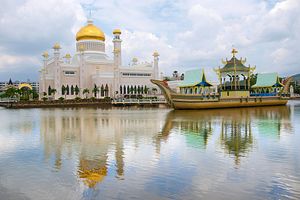The tiny oil-rich sultanate of Brunei has announced that it will delay the introduction of Sharia law “due to unavoidable circumstances”; however, officials were giving assurances that harsh Islamic penalties would still be implemented in the very near future.
No time frame was given after a report appeared in the Brunei Times quoting the assistant director of the Islamic Legal Unit as saying April 22 was only a tentative start date during a briefing with the Malaysian expat community and that the directive had come from the prime minister’s office.
A “declaration ceremony” was expected to go ahead as planned on April 30, marking the launch of the first phase of the new penal code.
Efforts to phase the laws in to a modern Southeast Asian state have been ridiculed by human rights groups, angered many of the sultan’s subjects, and prompted warnings from the International Committee of Jurists that the hardline religious edicts were incompatible with human rights law.
The decision to bring back Islamic laws was announced in October, shortly after the international media applauded the country’s one-year term as chair of the 10-nation Association of Southeast Asian Nations (ASEAN), packed their bags and left.
Critics have argued the decision on when to announce was timed to limit international criticism of the archaic medieval laws, which has earned Brunei comparisons with Saudi Arabia.
Sultan Hassanal Bolkiah, who possesses absolute executive authority as head of state and has ruled since 1967, had also insisted the Sharia Penal Code would only apply to Muslims and should be regarded as a form of “special guidance” from God. About two-thirds of Brunei’s 420,000 people are Muslim.
However, exceptions are apparently still possible, prompting leaders of the small Catholic congregations to announce that baptisms would be abandoned. This would not have pleased the Filipino community, while other members of ASEAN have remained tight lipped on the ramifications of the unprecedented legal move for East Asia and the impact a hardline Islamic state could have within the trading bloc.
ASEAN has high hopes of forging a single market and production base through the ASEAN Economic Community, slated for launch by the end of next year. It is expected to boast a combined GDP of $2.3 trillion, substantially more than India.
But Brunei’s insistence on imposing Sharia law has highlighted the religious and cultural differences between members. Sharia law, practiced in about 12 countries around the world including Pakistan and Afghanistan, will criminalize extra-marital affairs, consensual gay sex and re-introduce the death penalty by stoning along with amputations for thieves, ending a long-standing moratorium.
While senior officials within ASEAN have privately expressed their disappointment with the laws the bloc is maintaining its regimented mantra of not commenting on the internal affairs of a neighboring state.
The delay was announced while Bolkiah was in Singapore. According to the AFP news agency the government in Brunei was believed to be waiting for his return before introducing the new laws.
The introduction of Sharia law has been ridiculed by Bruneians on social media. Some have also complained bitterly about the lavish excesses of the Brunei royal family and their liking for Western vices usually banned by traditional Sharia laws. That anger has prompted an angry response from the absolute monarch.

































